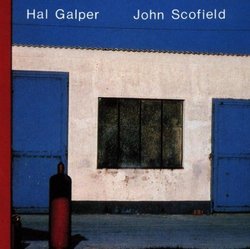| All Artists: Hal Galper Title: Hal Galper Quartet Members Wishing: 0 Total Copies: 0 Label: Enja Release Date: 11/24/1992 Genres: Jazz, Rock Styles: Acid Jazz, Jazz Fusion, Modern Postbebop, Bebop, Jam Bands, Jazz Jam Bands Number of Discs: 1 SwapaCD Credits: 1 UPC: 063757305323 |
Search - Hal Galper :: Hal Galper Quartet
 | Hal Galper Hal Galper Quartet Genres: Jazz, Rock
|
Larger Image |
CD Details |
CD ReviewsExcellent quartet album with early, tasty Scofield PH-50-NC | Southeast USA | 09/25/2006 (4 out of 5 stars) "This album is officially by the Hal Galper Quartet, but the front cover (of the CD edition, at least) has only "Hal Galper -- John Scofield" printed, as if they shared equal billing. Whatever the case, the personnel is Hal Galper, piano & composer of the four originals here, Scofield, guitar, Wayne Dockery on acoustic bass and future John Scofild Trio drummer Adam Nussbaum. The commements below concern Scofield's participation in the session, but before I make them I'll say that Galper is a fantastic, tasty pianist who, like Jim McNeely and Alan Broadbent, is unfortuately overlooked by the larger jazz audience.
The first piece is an unacompanied guitar solo (a rarity in the Scofield catalog) where Sco plays "Monk's Mood" (by Monk, of course). The 1965 Spanish popular song Yellow Days follows (it's best known, with its English lyric, as a Sinatra tune) and it is the only tune of the six not to feature Sco (Nussbaum is out too--it's a piano/bass duet). Then comes the four Galper originals, quartet numbers all except "Continuity," which is a guitar-piano duet. Scofield's sound and playing are superb--this is before he found the Roland Jazz Chorus amp sound, and the tone he gets on these early dates to me is just timeless. Sco, told Bill Milkowski in 1990, speaking of another late-70s session of his, "The sound of the guitar was not really together then. I've gotten much more adept at dealing with effects to fatten up my sound and get a wider variety of tones and colors. But basically, I hear all the same sort of stuff I do now." With all due respect, I beg to differ about the sound and it's "togetherness". With his cleaner tone, all the nuances of his amazing touch are brought forward--you aren't listening through the veil of a chorus effect. Perhaps it's just a matter of what context he's in--on recent albums like "Überjam," the guitar processing seems entirely appropriate and enhances his sound. On the other hand, in a more classic jazz setting like this date or his fabulous early-1980s trio records with Steve Swallow, I'm so glad he chose to use the sound he used." |

 Track Listings (6) - Disc #1
Track Listings (6) - Disc #1